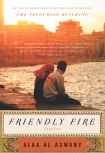Friendly Fire by Alaa Aswany (best books to read for students .TXT) 📕

Read free book «Friendly Fire by Alaa Aswany (best books to read for students .TXT) 📕» - read online or download for free at americanlibrarybooks.com
- Author: Alaa Aswany
Read book online «Friendly Fire by Alaa Aswany (best books to read for students .TXT) 📕». Author - Alaa Aswany
A minor mishap of the sort that happens all the time in war! The Iraqi tanks went on shelling Jenin until they had razed it to the ground. Then the negligible mistake was made complete, and Jewish soldiers descended from the Iraqi tanks and entered Jenin, which, to this day, they haven’t left.
On the evening of June 6, 1967, when Major Levy was appointed military governor of the city of Jenin, one of the sheikhs, wanting to have a joke with him, told him the story of the Iraqi tanks, and when Major Levy discovered that the people of Jenin had been on the verge of welcoming the tanks with roses, he removed his pipe from his mouth, jerked his body backward, and then burst out laughing so hard that he ended up coughing and weeping.
My dear Air Conditioning Attendant of the hall,
My dear Sound Engineer,
My dear Acrobat,
My thanks to you all.
Now my boorish Arab tale is done, and the ladies and gentlemen seated in the hall are still enjoying the air conditioning.
An Administrative Order
HIS NAME, IN FULL, WAS ‘UNCLE IBRAHIM’ and despite his poverty and pallid face, a surprisingly large paunch hung through the opening of his threadbare coat. While a paunch is considered among the middle classes a medical condition to be treated by diet and exercise, and merchants regard it as a palpable indication of blessings whose constant presence is to be desired, the paunches of the poor are and ever will be mere swellings that they carry around for no obvious reason.
Uncle Ibrahim’s shameless paunch had ruined him a full set of clothes that the doctors at the hospital had bought him the year before.
The records give Worker Muhammad Ibrahim’s job as ‘cleaner,’ at a wage of twenty pounds and thirty piasters precisely per month, but because Uncle Ibrahim was a kindly man with a cheerful manner, and because he was clean (and cleanliness was very important), the doctors had chosen him to make the coffee and tea, replacing Uncle Salih, who had retired.
Life thus became intermittently bearable. Given that Uncle Ibrahim had no other duties than his new job of “doing the tea and coffee” he would earn in tips more than half again over and above his basic wages. This enabled him to smoke as he wished, buy gallabiyas and shoes for his children (of whom the eldest was ten), and purchase a small piece of hashish so that he could prolong the act of sex with his wife. Uncle Ibrahim was even able (this happened twice) to pay for a place in a shared taxi when he was late for work.
Uncle Ibrahim counted on his thick fingers “five years of living decently”—living decently meaning that a soul didn’t have to beg; five years of “blessings for which we thank God.” And whatever he might do on a Thursday night, which was his wife’s preferred time for staying up late, Uncle Ibrahim was careful to be in the little mosque for the Friday prayer, and was accustomed to go there with clean body and clothes, and smelling good.
When the sermon started, Uncle Ibrahim would take his head in his hands and lower his eyes. One day, after a heated sermon on alms-giving, Uncle Ibrahim became aware of a guilty unease and made up his mind to do something, and thereafter he made a habit of selecting one of the hospital’s penniless patients and making coffee for him for nothing.
Uncle Ibrahim was a good man.
As the preacher at the mosque often said, nothing lasts forever.
A few months later, Worker Muhammad Ibrahim received an administrative order assigning him to the hospital gate, the supervisor saying as he handed it to him, “Congratulations, Ibrahim. Now you’re on the security staff.” Ibrahim felt an obscure sense of panic, but the scene played itself out and he took receipt of a black wool overcoat and huge military boots and started standing every day at the hospital gate, keeping out the visitors and saluting the doctors as they entered in their cars. For the first month, the smell of tea and hot water tormented Uncle Ibrahim, and he also had no choice but to beg, so he started talking all the time about his children’s illnesses and how they were falling behind at school. The doctors’ smiles turned tepid. “God willing, He will find you a way, Uncle Ibrahim,” they would say.
The second month, Uncle Ibrahim went to his supervisor and put a stop to his begging with the words, “I want to go back,” and the supervisor quietly raised his hand and removed his glasses, as he pronounced in a hateful voice, “It’s an administrative order, Ibrahim.”
The third month, Uncle Ibrahim changed greatly. He stopped greeting the doctors as they entered in their cars. He took to sitting on his seat by the gate and holding his black coat tightly closed. His face acquired a fixed expression and his looks turned hard and unrelenting.
Those who were present at the scene say that the old lady had wanted to enter the hospital to visit her sick son. Because visits were not permitted at that hour of the morning and because she kept on insisting, Uncle Ibrahim stood, went over to her, looked at her





Comments (0)